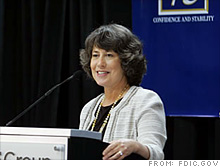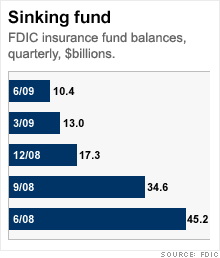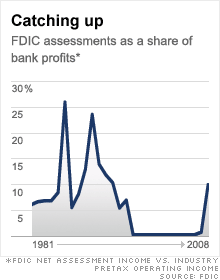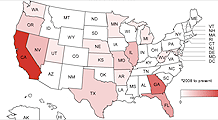Bank bailout problem: No easy answers
FDIC has a decision to make: How to replenish its insurance fund. With failures mounting and banks complaining about fees, borrowing from Uncle Sam may be the best way out.
 |
| Sheila Bair said she would 'never say never' about borrowing from Treasury. |


NEW YORK (Fortune) -- It's time for Sheila Bair to stop worrying about bailout politics and hit Uncle Sam up for some dough.
Bair is the chairman of the Federal Deposit Insurance Corp., the federal agency that administers the insurance fund that stands behind the savings of millions of Americans.
The fund is paid for by the banks that benefit from it, but it has been depleted by a wave of bank failures that isn't expected to abate any time soon.
The FDIC board is scheduled to meet Tuesday to discuss how to raise money to restock the fund. There aren't a lot of good options.
Bair could easily borrow the cash from Treasury, where the FDIC has a standing credit line. But the agency hasn't done so in nearly 20 years, since the trough of the last banking crisis. And with bailout rage lingering in the air, Bair has made clear she's not eager to break that precedent.
She said last week that whether to tap the Treasury credit line is a "philosophical question" for bankers and their regulators. The central issue: Is the Treasury backstop there for foreseeable losses or for "unexpected emergencies?"
That comment reminded listeners that as heavy as the FDIC's burden has been -- 95 banks have failed this year, on top of 25 last year -- the agency is still wary about the possible collapse of a giant, multibillion-dollar institution.
But another danger is that if the FDIC fails to take prompt and transparent action, the public could again lose faith in the financial system -- at a time when bad news about failing banks is certain to continue.
"I don't understand why Sheila just does not use her Treasury line to recapitalize the fund in the same way that she encourages banks in similar situations to recapitalize themselves," said Ken Thomas, a Miami-based banking consultant who has testified before Congress on deposit insurance funding.
"By doing this," Thomas added, "she would put an end to all of this growing and troubling uncertainty about the shrinking fund, which does nothing but detract from confidence in the FDIC which is the most important concern."
What Bair would rather do is what the agency typically does -- collect funds directly from banks -- or turn to what she describes as other tools, such as raising money by issuing debt to banks.
The FDIC has warned banks that they may have to pony up another special fee to support the insurance fund, whose balance fell to a 17-year low of $10 billion this summer.
But the banks, which have been socked with one special fee this year, are warning that a tax on their already weakened profits could push a number of them over the edge and stall the economic recovery that has gingerly taken hold since spring.
And for once, they may not just be blowing smoke. The industry posted a $3.7 billion loss in the second quarter, when one in four institutions were unprofitable. The FDIC classifies more than 400 institutions -- nearly 5% of its membership -- as troubled.
Whatever the industry's problems, many commentators have dismissed the prospect of the FDIC using its Treasury credit line as another bailout. The agency has a $100 billion standing credit line with Treasury -- and, thanks to a law passed this year, the authority to borrow as much as $500 billion through 2010 in an emergency.
Given that the industry paid essentially no insurance premiums for a decade, it's easy to see why there might be some resentment over a fresh demand for taxpayer funds.
Between 1997 and 2006, the industry made $1.28 trillion in pretax operating profits, according to FDIC data. During that period, thanks to a 1996 law that prohibited the agency from assessing well capitalized banks, the banks paid just $672 million in insurance premiums.
Yet given the banks' current problems -- and the federal laws that oblige the industry to, over time, fully repay any Treasury borrowings -- the option of drawing on the credit line is gaining backers in unexpected places.
Rep. Barney Frank, D-Mass., chairman of the House Financial Services committee, said this week he believes using the credit line is the "cleanest" way to solve the FDIC's funding questions.
And Thomas -- who twice last decade proposed boosting the minimum size of the deposit insurance fund, so that the FDIC fund would never repeat its brush with insolvency in the early 1990s -- dismisses the bailout talk as a red herring.
"This idea that she does not want to go to the Treasury because of the perception of a federal 'bailout' does not make sense, since everyone knows that FDIC is ultimately backed by the full faith and credit of the U.S.," said Thomas.
Whatever outsiders think, the FDIC board -- led by Bair and staffed by two members of the FDIC and two other federal banking regulators -- will soon decide. An FDIC spokesman said it's likely the agency will put some proposals out for public comment Tuesday, rather than making a decision on the spot.
The shifting debate seems to have left even the politically savvy chairman a bit bemused.
"The political dynamic on this is interesting," Bair said this month after her speech at Georgetown University. "People are shifting from not wanting this to go to taxpayers to wanting it to go to taxpayers." ![]()
-
 The retail giant tops the Fortune 500 for the second year in a row. Who else made the list? More
The retail giant tops the Fortune 500 for the second year in a row. Who else made the list? More -
 This group of companies is all about social networking to connect with their customers. More
This group of companies is all about social networking to connect with their customers. More -
 The fight over the cholesterol medication is keeping a generic version from hitting the market. More
The fight over the cholesterol medication is keeping a generic version from hitting the market. More -
 Bin Laden may be dead, but the terrorist group he led doesn't need his money. More
Bin Laden may be dead, but the terrorist group he led doesn't need his money. More -
 U.S. real estate might be a mess, but in other parts of the world, home prices are jumping. More
U.S. real estate might be a mess, but in other parts of the world, home prices are jumping. More -
 Libya's output is a fraction of global production, but it's crucial to the nation's economy. More
Libya's output is a fraction of global production, but it's crucial to the nation's economy. More -
 Once rates start to rise, things could get ugly fast for our neighbors to the north. More
Once rates start to rise, things could get ugly fast for our neighbors to the north. More








